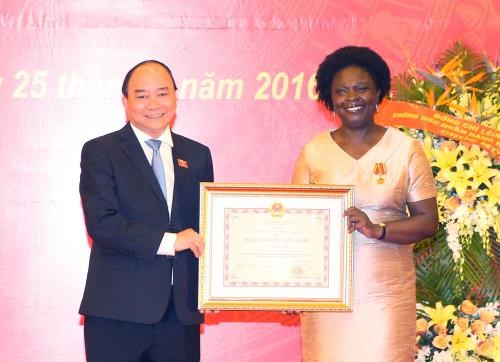
Prime Minister Nguyen Xuan Phuc presents the Friendship Order to Victoria Kwakwa, Regional Vice President for East Asia and the Pacific of the World Bank (WB).
Governor of the SBV Le Minh Hung, and WB Vice President for East Asia Pacific region (former WB country director for Viet Nam) Victoria Kwakwa, signed the agreements, which are aimed at supporting Viet Nam’s competitiveness, climate change adaption and water management.
In particular, the Third Economic Management and Competitiveness program, worth US$ 162 million (including US$ 12 million from the Canadian and Sweden Governments) supports the Vietnamese government to complete the institutional framework, reform important fields including banking, State investment and State-owned enterprises in order to stabilize the macro-economy, attract investment and improve the competitiveness of the economy.
About US$ 90 million will be used for supporting climate change and green growth policy activities.
The US$ 119-million Urban Water Supply and Wastewater Project in Viet Nam targets to help Viet Nam complete the institutional framework for environmental protection and climate change response as well as assist localities in improving infrastructure to cope with climate change and poverty reduction.
At the event, PM Nguyen Xuan Phuc awarded Mrs. Victoria Kwakwa the friendship order for her effort and contribution to strengthening the cooperation of the WB for Viet Nam’s socio-economic development process.
Speaking at the ceremony, Ms. Victoria Kwakwa said that the WB is deeply interested in the key reforms of the economy, synchronous infrastructure development and climate change adaptation for poverty reduction and sustainable development.
Ms. Kwakwa expected that inked programs and projects will be successfully launched and the loans from the WB will be effectively used, which contribute to promoting the cooperation between the WB and Viet Nam in the future.
On this occasion, Governor Hung also awarded Mrs. Kwakwa a medal in recognition of her contribution to the development of Viet Nam’s banking system.
Deputy PM meets WB Vice President in HanoiDeputy Prime Minister Trinh Dinh Dung has asked the World Bank to continue offering preferential loans to Vietnam so that the Government and private sector of Vietnam can continue working towards a better infrastructure system.
During a meeting with Victoria Kwakwa, World Bank Vice President for East Asia and the Pacific on July 25 in Hanoi , the Deputy PM said that Vietnam is also focusing on improving transport infrastructure, especially highways and roads leading to border gates.
Hailing the WB Vice President’s contributions to the development of Vietnam during her offical tenure as WB Country Director in Vietnam, the Deputy PM said Vietnam is in need of investment for the synchronic development of infrastructure systems for socio-economic development, so the country hopes the WB will extend Vietnam’s access to preferential lending in the form of Official Development Assistance (ODA) and loans of the International Development Association (IDA).
He valued the WB’s financial assistance to Vietnam in infrastructure building, transport, energy, urban upgrade, waste water treatment, climate change response and other social fields, which he described as important resources for the socio-economic development of Vietnam that help the country attract more domestic and foreign investment.
Vietnam pays much attention to the effectiveness of loans from the international community and the WB in particular, he said, adding that Vietnam is tightening the supervision and management on the capital.
For her part, Victoria Kwakwa said the priorities that Vietnam has set for the next five years, including macro-economic development, climate change response, transport and energy, will be the foundation for the country’s socio-economic development.
She recommended that the Government of Vietnam pay more attention to attracting investment and mobilising capital resources amidst high public debts. The country should also use assistance effectively, while strengthening the monitoring of the State budget, and calling for more investment from the private sector, she suggested.
VNA